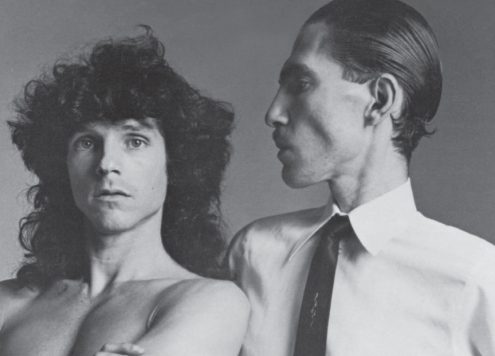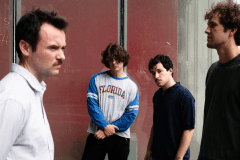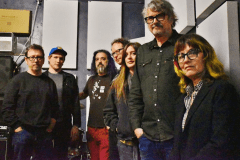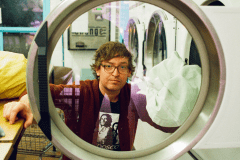Today's Cross To Bear: An interview with Grant Hutchinson of Frightened Rabbit
By Jeff Locher
The beginning of Frightened Rabbit’s new album Pedestrian Verse provides a perfect introduction to Scott Hutchinson’s lyrics:
I am that dickhead in the kitchen / Giving wine to your best girl’s glass
I am the amateur pornographer / Unpleasant publisher by hand
Not here, not here / Heroic acts of man
…
I’m here, I’m here / Not heroic but I try
Those words, initially sung in falsetto and backed just by piano and light drums, eventually give way to big-time college-rock sing-along bliss. Frightened Rabbit’s music sounds bigger than ever now that it has moved off U.K. indie Fat Cat to take advantage of the major-label resources Atlantic Records can provide.
Pedestrian Verse’s sound must be attributed at least in part to producer Leo Abrahams, a man who’s spent more than a decade assisting Brian Eno, but some must also be a result of the rest of the Scottish band’s members getting a bigger stake in the songs for the first time. Grant Hutchinson—the first person to join his brother as a member of Frightened Rabbit—didn’t just back his brother on drums for this album; he and his bandmates collaborated with Scott in its songwriting.
Grant talked with Ghettoblaster Magazine about Pedestrian Verse and his brother’s cleverly morose lyrics as Frightened Rabbit began its U.S. tour in March.
I wish I were going to see you play tomorrow night at my favorite venue ever, the Showbox at the Market in Seattle, which is sold out. You’ve played there before, right?
We have, yeah; it’s a great venue.
Are you in Seattle today?
No, we’re currently in L.A. doing a session [“Morning Becomes Eclectic”] with KCRW.
Have you guys spent much time in Seattle when you’ve been there? I wonder if you’d like it because it’s kind of like Scotland.
I love it; it’s one of my favorite cities in the U.S., definitely. It reminds me of Glasgow. It’s got the weather, obviously; it’s quite grey, which makes us feel at home. The music scene is incredible, as it is in Glasgow. Decent people as well—friendly people who are quite humble—so we definitely feel at home when we’re in Seattle.
On the new album, on songs like “State Hospital,” Scott kind of stepped out of himself in writing lyrics, but still a lot of the songs are pretty personal to him. Sometimes his lyrics are really self-deprecating, but in a likable way. Does he really feel that bad about himself, or is he making exaggerations to entertain us?
It depends [laughs]. Most of the songs are true and honest and autobiographical, and the albums are chronological. If we’re looking at The Midnight Organ Fight (2008), that is how Scott felt. As everyone knows, it’s a straight-up break-up album—nothing more to it. When he was going through that, he was crashing in a cupboard in my flat, so that was heavy.
On this one, it’s come back to the same brutal honesty, but Scott has taken a step outside himself and is looking more at other people’s lives. Look at the “State Hospital” lyrics, and it’s not about Scott, obviously; it’s about a female character who’s born into a life that she’ll never be able to change. But I think always something Scott always does is there’s this little glimmer of hope he like to get in there, especially at the end of “State Hospital,” I would say. It’s definitely different this time: Still it’s honest, and still it’s brutal and heartfelt, but it’s not just Scott moaning about his own life.
Did the band help Scott write lyrics for Pedestrian Verse? I read that this was a more collaborative album…
No, no. The lyrics always will remain with Scott. Although we’ll collaborate on music, I think it’s important to still have that thread that people recognize throughout Frightened Rabbit records. To be honest, I don’t think any of us would really feel like taking on that responsibility because we all feel that out of the five of us he’s the best lyricist. And out of a lot more people he’s definitely one of the best lyricists around. It’s not something that any of us would be interested in getting involved in.
I was watching the “Making of Pedestrian Verse” video online and listening to Scott talk about the band’s musical collaboration, and he said that while it involved some arguments that he didn’t always get to win, it was really rewarding in the end. Can you talk about any of those arguments to give a glimpse into the writing or recording process?
It rarely got to the full-blown argument stage because it was a decision essentially that Scott made—and he had to make it—that he wanted us to write with him. We toured together as a five-piece for two or three years before we felt like we had arrived at the stage where we were a band and could all have our input be as important as everyone else’s. No specific arguments… A lot of times, maybe Scott just left the room. It was difficult for us to find where our place was in the writing process, and at the same time difficult for Scott to relinquish responsibilities that he’s had for the past six or seven years. It was all very democratic, a good experience, all very positive stuff.
Also in that making-of video, Scott mentioned that American artists like Ryan Adams and Jeff Tweedy were influences on him. What have you guys learned from touring with American artists, especially with Death Cab for Cutie in 2011? Did those guys give you any sage advice?
We definitely learned a lot from Death Cab and also from a Scottish band called Biffy Clyro. They’ve had a similar path in that they worked away and had a few records before people started taking notice. Touring with Death Cab really affirms your faith in the process of working, touring, and giving it time. A lot of bands get to a certain stage of success and they don’t know how to handle it or where to go from there, and that can create a lot of pressure. The way Death Cab and Biffy have done it—and the way we’re in the process of trying to do it—is just to work hard, plod away at it, and don’t turn something down because you think you’re above it. Death Cab is a band we really look up to in that sense, and musically as well. Ben Gibbard is one of the greatest lyricists we have at the moment. Just their ethos as a band as well—they take it very seriously and are beyond the stage of drinking up and gathering ‘round screaming.
There was a piece in Stereogum recently that talked about Pedestrian Verse as being “a bunch of really great tracks that are actually rewarded by being pulled away from the group,” kind of making it sound like a good collection of singles as opposed to a concept album. What do you think about that?
I can see the angle that they’re coming from. I think we’d like it to be described as possibly chapters in a book. It’s definitely not a concept album in any way. I think there were parts of it when Scott started writing where he had a bit of that in his head, but… Yes, it is a collection of songs, but there’s a thread that runs through them like on any album we’ve done in the past. I think it comes together really well, and again, it’s not just Scott moaning about his life time after time [laughs].
With that analysis in mind, can you say why “Today’s Cross” didn’t make the album? The video for that just came out, and it’s a really great song.
We had three or four songs this time—or if you include the EP we put out last year we had seven or eight songs—that just didn’t fit. We’re a band that looks at sequencing as something really important, and we don’t want to just chuck a bunch of songs down in any order. There are a couple extra songs on the deluxe version, and people have asked why those didn’t make the record. We just didn’t find a place for them. We messed around a bit, threw some in, took some others out, and we settled on ten main tracks that sort of fell into place. But the songs we put on the EP and “Today’s Cross,” we didn’t want them to disappear and for people never to hear them, so it was important that we got the chance to make a little video [of “Today’s Cross”] and have it released as a B-side. We felt the songs were strong, but there just wasn’t a place for them on the record. And the video was a lot of fun [laughs]!
In the video for “Today’s Cross,” Jesus plays a cassette that’s labeled, “Frightened Rabbits,” and the pluralized band name shows up in the video for “Backyard Skulls” too. Did people used to make that mistake on marquees a lot?
That’s a complete and utter coincidence. Well, it was done on purpose both times. We didn’t know that the guy who made the “Today’s Cross” video had already done that before we arrived, and same with the other one. Our Twitter handle also has an “S” at the end of it. I think it’s fine as long as people are listening to our music. If there was another band called Frightened Rabbits, they might get confused. That would be annoying.
Is “Today’s Cross” related to the Frightened Rabbit logo? I was wondering what the cross with the two horizontal lines means.
Ah, nothing really. Scott’s responsible for all the artwork, and he’s quite into symbolism. He did a lot of work on that in art school. I think his main interest and the point of those symbols is that they do mean nothing, but like yourself, people will look at them and go, “I wonder what that means” and think about it for themselves. That’s brilliant because it’s open to interpretation. We’ve added an extra one, so there’s three [horizontal] bars now on the new artwork, whereas previously there were only two bars [on the cross symbol]. People had started getting tattoos, and now they’re all pissed off because they don’t have three bars. That’s kind of the purpose of the whole thing. Essentially, it’s not really meant to mean anything, but whatever you find in it is fine for you. You can take what you like from it.
There have been a lot of great Scottish rock bands in your same vein over the past several years, like The Twilight Sad. You guys all seem to get along well and work together from time to time. What is it about Scotland? Do you guys have something in the water or the Scotch whisky that makes for really good indie rock?
Well, the water is what creates the whisky that we all drink, so that’s important… As a nation, we are very into looking at dark humor—James [Graham] from the Twilight Sad, Aidan Moffat from Arab Strap as well, and Malcolm Middleton. I think we all have that sort of miserable streak that comes across with that humor, and not taking yourself too seriously. The weather’s shit, so you can spend a lot of time indoors playing music. That’s basically what it comes down to. You’ve got Arab Strap there, and you’ve got Belle and Sebastian going back even farther, and Mogwai as well. When you grow up being surrounded by bands like that, and if you have any interest in music at all, those kinds of artists can only fuel your interest and make you want to be part of something. We’ve always felt that way, and hopefully in the future bands will feel the same way about us.









Social Media